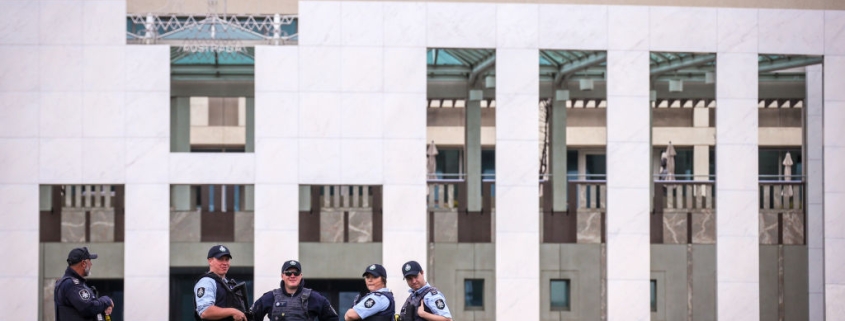Australian politics needs clearer national security boundaries
We need to establish clearer political boundaries around national security to avoid politicising ongoing security issues and to better manage secondary effects.
The Australian Federal Police (AFP) revealed on 10 March that the Dural caravan laden with explosives and an antisemitic note naming Jewish community targets, discovered 19 January, was a hoax orchestrated by criminal actors.
Political debates around national security have focused on the caravan since its discovery. The AFP’s revelation voided much of the rampant speculation, perfectly demonstrating the need to establish better political boundaries.
The AFP confirmed the caravan was essentially a ‘criminal con job’—an ‘elaborate scheme contrived by organised criminals, domestically and from offshore.’
The AFP believe that those responsible were trying to ‘change their criminal status’, likely attempting to leverage information about the plot in exchange for reduced sentences. In short, criminals sought to exploit security fears for personal gain. While police are clear that, for various reasons, there was never a real terrorist or mass casualty threat—there was no detonator, for example—it is important to acknowledge that the plot was convincing and created real safety concerns for Jewish Australian communities.
Despite a lack of formal designation, the caravan was initially presented as a terrorist plot, including by NSW Premier Chris Minns and Prime Minister Anthony Albanese. It followed months of hate crimes and December’s designated terrorist attack against the Adass Israel Synagogue in Melbourne.
However, this quick political designation and ensuing discussions likely heightened community fears and enhanced criminal actors’ ability to exploit them. The caravan was discussed repeatedly in federal and state parliaments and the media despite the ongoing police investigation, often alongside criticism of governmental responses to rising antisemitism.
Silence in the face of national security threats is a problem, and government messaging around the Dural caravan and other incidents has been lacking. But loud inaccuracies can be as bad or worse—particularly if they create secondary psychological effects that criminals are trying to exploit, such as public fear.
Clearer government statements would have better informed the public and managed fears. Delays in messaging also leave further room for misinformation. But the political handling of the Dural case is also defined by a heavily partisan approach and politicking at the expense of accuracy. Clearer messaging in the first instance is needed, but so are mechanisms to reduce the misinformation window of opportunity.
Partisan discussion of the Dural caravan was clear in Parliament. In February, Liberal member of parliament Julian Leeser, while discussing a motion to condemn antisemitism, said that the plot was evidence that Australia faces a ‘domestic terrorism crisis’ and criticised the government for failing to adequately support the Jewish community.
That same day, opposition foreign affairs spokesperson David Coleman raised the caravan while specifically criticising Albanese:
… extraordinarily, a caravan packed with explosives, apparently targeting Jewish addresses, and a prime minister who was in the dark—oblivious. This is an extraordinary failure by a weak prime minister, and it is marking our national character.
Days later, Jason Wood, another Liberal MP, listed a series of antisemitic attacks, calling Dural ‘the big one’ before echoing Coleman’s sentiment:
the prime minister should have been very strong on this right from the very start, instead of trying to walk on two sides of the road at the same time.
While firmer leadership was needed, we now know there were complex factors to consider. Investigators suspected early in the process that the plot was a hoax. The operation was not straightforward, and there actually were a few sides of the road to walk—often the case with such investigations.
Opposition Leader Peter Dutton raised the caravan matter with the media on multiple occasions, repeatedly criticising Albanese’s handling of the case. Speaking to the ABC, Dutton criticised Albanese for not being immediately briefed on the caravan incident, which he labelled ‘potentially the biggest terrorist attack in our country’s history’, and said the prime minister’s actions constituted ‘an absolute abrogation of his responsibility’. He also speculated that NSW Police may have had concerns the prime minister’s office would leak the information and that this may have been the reason Albanese wasn’t briefed.
In contrast, when pressed for particulars, the prime minister often noted that the Dural caravan was subject to ongoing investigation.
This discourse had flow-on effects. The caravan was repeatedly cited in debate relating to the Criminal Code Amendment (Hate Crime) Bill. Critics of the government were pushing for mandatory minimum sentences—an objective they eventually achieved.
Due to the incident’s recency, greater consideration should have been given to the investigation process. Misrepresentation of the incident was not intentional, but it was speculative and premature, affecting the integrity of debate and legislation.
Media should hold politicians to account. Law enforcement can better support this by more quickly and more directly making information available to reporters, even if limited only to reminders that investigations are ongoing, details are classified or claims are unsubstantiated. Importantly, this aligns with national security objectives by managing secondary effects and preventing social division.


